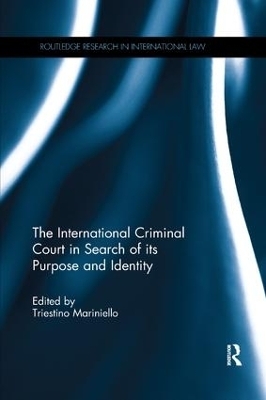
The International Criminal Court in Search of its Purpose and Identity
Routledge (Verlag)
978-1-138-28058-8 (ISBN)
The book focuses on the key procedural and substantive challenges faced by the ICC since its establishment. The critical analysis of the normative framework aims to elaborate ways in which the Court may resolve difficulties, which prevent it from reaching its declared objectives in particularly complex situations. Contributors to the book include leading experts in international criminal justice, and cover a range of topics including, inter alia, terrorism, modes of liability, ne bis in idem, victims reparations, the evidentiary threshold for the confirmation of charges, and sentencing. The book also considers the relationship between the ICC and States, and explores the impact that the new regime of international criminal justice has had on countries where the most serious crimes have been committed. In drawing together these discussions, the book provides a significant contribution in assessing how the ICC’s practice could be refined or improved in future cases. The book will be of great use and interest to international criminal law and public international law.
Triestino Mariniello is a Lecturer in Law at Edge Hill University, UK.
Introduction: ‘One, No One and One Hundred Thousand’: Reflections on the Multiple Identities of the ICC, Triestino Mariniello Part 1: Crimes and Modes of Liability 1. The case for inclusion of terrorism in the jurisdiction of the International Criminal Court, Harmen van der Wilt & Inez Braber 2. Command responsibility, joint commission and ‘control over the crime’ approach in the first ICC jurisprudence, Chantal Meloni Part 2: Rights of the Accused and of Victims 3. The right not to be tried twice for international crimes: An overview of the ne bis in idem principle within the Statutes of the ICC and the International Criminal Tribunals, Stefano Manacorda & Giulio Vanacore 4. Balancing Rights of the Accused with Rights of Victims before the International Criminal Court, Morris Anyah 5. Lubanga Decision on Victims' Reparations: Handing off the Hot Potato?, Paolo Lobba Part 3: The Relationship between the International Criminal Court and States 6. Building National Capacity for the International Criminal Court: Prospects and Challenges, Olympia Bekou 7. Has the International Criminal Court Unfairly Targeted Africa or has Africa Unfairly Targeted the International Criminal Court?, Lyal S. Sunga 8. Transitional Justice in DRC: The 2014 Amnesty Law and the Principle of Complementarity – Quid Juris?, Patricia Pinto Soares Part 4: Applicable Law and Judicial Creativity 9. The first Decision on Sentence of the International Criminal Court in the Lubanga case: Great (Unmet) Expectations, Silvia D'Ascoli 10. The Confirmation of Charges at the International Criminal Court: A Tale of Two Models , Triestino Mariniello & Niccolò Pons 11. From Lubanga to Ruto: Witness Proofing under the Applicable Law of the ICC, Sarah Finnin 12. General Principles of Law in the Early Jurisprudence of the ICC, Mohamed Badar & Noelle Higgins
| Erscheinungsdatum | 08.01.2017 |
|---|---|
| Reihe/Serie | Routledge Research in International Law |
| Zusatzinfo | 1 Tables, black and white |
| Verlagsort | London |
| Sprache | englisch |
| Maße | 156 x 234 mm |
| Gewicht | 453 g |
| Themenwelt | Recht / Steuern ► Allgemeines / Lexika |
| Recht / Steuern ► EU / Internationales Recht | |
| Recht / Steuern ► Öffentliches Recht ► Völkerrecht | |
| Recht / Steuern ► Strafrecht ► Kriminologie | |
| Sozialwissenschaften ► Politik / Verwaltung ► Europäische / Internationale Politik | |
| ISBN-10 | 1-138-28058-5 / 1138280585 |
| ISBN-13 | 978-1-138-28058-8 / 9781138280588 |
| Zustand | Neuware |
| Haben Sie eine Frage zum Produkt? |
aus dem Bereich


